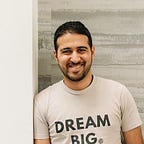Empire State of Food: Why I am Focusing My Data Science Skills To Help Farmers
I decided to enter data science because I wanted to use technology and data to have a positive impact on people’s lives. To that end, I have worked with DataKind on a project that helps identify jobs that are worker friendly. My specialization project while at Cornell Tech was focused on analyzing the “creepware” space, as we call it, on Android devices. Creepware is a term we coined to describe the various types of apps that have “creepy” use cases, such as stalking someone or taking control of their phone. For the past year, I worked with the Intimate Partner Violence (IPV) team at Cornell Tech to explore the data that we had in collaboration with Norton Security, and also build machine learning pipelines with the hope that it would one day help automate the team’s work. All with the intent of helping victims of intimate partner violence avoid technological abuse.
Fast forward to this semester. I wanted to continue getting experience using data for social good. A friend of mine, Leanna Mulvihill, used her specialization project to study farms. As a farmer herself, she had a deep expertise of the different pain points that farmers experience, particularly small farms. Leanna also knew of interesting organizations, such as the Hotchkiss School, that use small farms to supply some of the produce and goods for their kitchens. However, this process can be unwieldy. Managing multiple farm relationships, keeping track of multiple orders from multiple places, and making sure that each order has a purpose to reduce food waste and provide quality meals, this idea of sourcing from local farms can start to sound unscalable.
This excites me. With Leanna Mulvihill’s contextual expertise, I will be able to derive even more insight into the data that she has. Combine that with her partner’s, Prasenjit Roy, business prowess and Paula Barmaimon’s, my partner for the IPV project, insight into data and formidable visualization skills, our team is both highly skilled and fantastic to work with. I have known all of them for over a year now, and have worked on various projects with them. Having the opportunity to tackle such an important problem with such a fantastic team is both humbling and exhilarating.
Over the next several months, we will be building out our web app for both buyers and farmers, fine-tuning a bipartite matching algorithm that Leanna Mulvihill and Prasenjit Roy have built to match farmers and buyers, performing massive amounts of user testing and user interviews, and culminating in a pilot run that we hope to do by the end of March. This is an extremely exciting project that could help institutions have higher quality food for lower costs and could even help reduce carbon emissions, due to our focus on the farms being local to the institution. This project allows me to flex my skills as a data scientist, and work with amazing people, while potentially influencing farmer’s lives for the better.
______________________________________________________________
About the Author
Daniel Nissani is a graduate student at Cornell Tech, a board of trustees member of the Brooklyn Free School, and the former QuestBridge Regional Alumni Club of New York City. He was a Math for America Early Career Fellow, a co-founder of the Northwestern Quest Scholars Network, and a Ryan Scholar at Northwestern University. Daniel is currently looking for positions as a data scientist, hoping wherever he ends up, he’ll be able to make a positive social impact.
